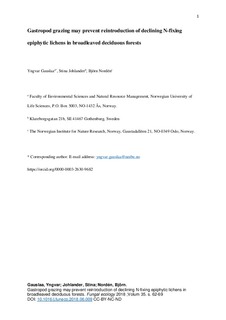Gastropod grazing may prevent reintroduction of declining N-fixing epiphytic lichens in broadleaved deciduous forests
Journal article, Peer reviewed
Accepted version

Åpne
Permanent lenke
http://hdl.handle.net/11250/2558577Utgivelsesdato
2018Metadata
Vis full innførselSamlinger
- Publikasjoner fra CRIStin - NINA [2397]
- Scientific publications [1423]
Sammendrag
We studied the potential to use reintroduction of two declining N-fixing flagship lichens to identify factors affecting failure or success in SW Swedish sites that had experienced substantially reduced acidification. After transplanting the critically endangered Lobaria amplissima ± external cephalodia and its near-threatened associate Lobaria pulmonaria onto tree trunks, seasonal growth rates were quantified. We added a phosphorus treatment, using site as a random factor. Growth was positive in winter, and negative in summer, particularly in L. amplissima. Reintroduction of L. amplissima was unsuccessful because gastropods caused significant loss, evidenced by grazing marks. Acer platanoides, a high-pH host, had more grazing than the more acidic Quercus petraea. Gastropods preferred the cephalodia, resulting in substantial loss of the cephalodiate L. amplissima. Phosphorus fertilization had no effects. The widespread L. pulmonaria grew faster than the rare L. amplissima that lost its local growth potential due to aggravated gastropod grazing.
